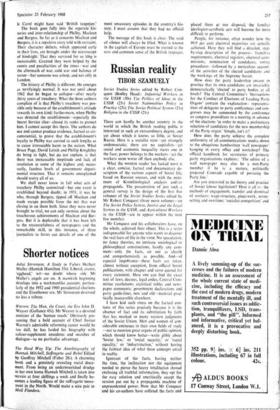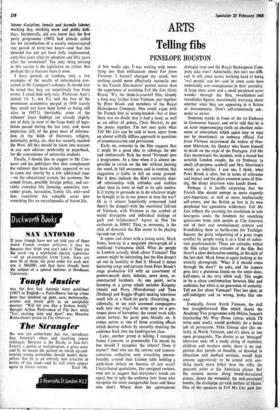Russian reality
TIBOR SZAMUELY
Soviet Studies Series edited by Robert Con- quest- (Bodley Head): :Industrial Workers in the USSR (30s) The Politics of Ideas in the USSR (25s) Soviet Nationalities Policy in Practice (25s) The Soviet Political System (21s) Religion in the USSR (21s) •
There can hardly. be another country in the world in which the British reading public is interested to such an extraordinary degree, and yet about which it knows so little, as Soviet Russia. Here is a socialist state—yet strangely undemocratic; there are no capitalists—yet social and economic inequality stares one in the face; power belongs to the workers—yet the workers seem worse off than anybody else.
What the western reader has lacked most is a clear, concise, factual and documentary de- scription of the various aspects of Soviet life, based on Russian sources, and with the mini- mum of Kremlinological analysis and/or propaganda. The presentation of just such a general survey is the design of the first five volumes -of the Soviet Studies Series edited by Mr Robert Conquest (three more volumes—on The Soviet Police System, Justice and the Legal System in the cISSR, and• Agricultural Workers in the USSR—are to appear within the next few months).
Mr Conquest and his collaborators have, on the whole, achieved their object. This is a series indispensable'for anyone who wants to discover the real facts of life in the USSR. No speculation, no fancy theories, no intricate sociological or philosophical constructions, hardly any com- ment—only the facts, set out as clearly and comprehensively as possible. And—of especial impottance—these facts are taken, almost without exception, from official Soviet publications, with chapter and verse quoted for every statement. Here one can find the exact text of laws, decrees, legal codes, Central Com- mittee resolutions; statistical tables and news- paper comments; government declarations and party guide-lines, new and old—material prad- tically inaccessible elsewhere.
I have laid such stress on the factual con- tents of this series precisely because it is the absence of fact and its substitution by faith that has marked so many western judgments of the Soviet Union. Men and women of con- siderable eminence in their own fields of study —not to mention great organs of public opinion, which should know better—write glibly about 'Soviet law,' or 'social security,' or 'racial equality,' or 'indoctrination,' without having the faintest idea of what these concepts entail in reality.
Ignorant of the facts, having neither the time, the inclination nor -the equipment needed to pierce the heavy totalitarian shroud enclosing all truthful information, they opt-for the easy solution and uncritically accept the version put out by a propaganda machine of unprecedented power. Now that. Mr Conquest and his co-authors have collated the facts and
placed • them at our disposal;' the familiar ideologico-acrobatic acts will become far more difficult to perform.
People, for instance, often wonder how the 99.9 per cent electoral majorities are actually achieved. Here they will find a detailed, step- by-step description of the process: franchise requirements, electoral registers, electoral com-
missions, nomination of candidates, voting procedures—followed by a meticulous accoun: of the activities of the elected candidates and the workings of the Supreme Soviet.
How does the party leadership ensure in practice that its own candidates are invariably democratically 'elected' to party bodies at all levels? The Central Committee's 'Instructions for the Conduct of Elections of Leading Party Organs' contain the explanation : representa- tives of delegates to party conferences and con- gresses may be summoned by the conference or congress praesidium to a meeting in advance of the elections 'in order to make a preliminary selection of candidates for the new membership of -the Party organ.' Simple, isn't it?
How does the party achieve the complete uniformity of all communications medial down
to the ubiquitous handwritten 'wall newspaper'
hanging in every office and workshop'? The official, handbook for secretaries of primary
party organisations explains : 'The editor of a wall newspaper may also be a non-Party member if he is a mature, politically prepared Comrade capable of pursuing the Party line.'
Are you interested in. the theory and practice of Soviet labour legislation? Here it all is: the methods of engagement, transfer and dismissal of workers; wage-structure, piece-work, norm- setting and overtime; 'socialist competition' and
labour discipline; female and juvenile labour, working day, working week and public holi- days. Incidentally, did you know that the first party programme (1903) had already called for the introduction of a weekly uninterrupted rest period of forty-two hours—and that this demand has not yet been fully implemented, sixty-five years after its adoption and fifty years after the revolution? The only thing missing in this section is the legislation on strikes. But perhaps this is because there is none.
I have quoted, at random, only a few examples of the wealth of information con- tained in Mr Conquest's volumes. It should also be noted that they are surprisingly free from errors. I could find only two : Professor Ayer's initials (A. J., not F.), and the fate of the prominent economists purged in 1930 (surely they could not have been listed as being still alive in 1957?). Inevitably, some of the volumes' latest findings are already slightly out of date, in view of the large body of legis- lation passed during the last year, and, more important still, of the great mass of informa- tion in the fields of literature, religion, nationality policy, etc, that has recently reached the West. All this should be taken into account in any new edition—preferably in paperback, for the convenience of university students.
Finally, I should like to suggest to Mr Con- quest and his publishers that they complement the volumes that have already appeared or are to come out shortly by a few additional ones —on the educational system, the economy, the armed forces, possibly foreign policy, and cer- tainly everyday life (housing, amenities, con- sumer prices, recreation, family life, etc)—and thus transform this valuable series into something like an encyclopaedia of Soviet life.



































 Previous page
Previous page